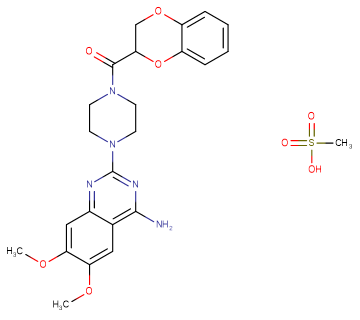
Doxazosin mesylate
CAS No. 77883-43-3
Doxazosin mesylate( UK 33274-27 )
Catalog No. M15940 CAS No. 77883-43-3
Doxazosin mesylate(UK 33274) is a quinazoline-derivative that selectively antagonizes postsynaptic α1-adrenergic receptors.
Purity : >98% (HPLC)
 COA
COA
 Datasheet
Datasheet
 HNMR
HNMR
 HPLC
HPLC
 MSDS
MSDS
 Handing Instructions
Handing Instructions
| Size | Price / USD | Stock | Quantity |
| 200MG | 34 | In Stock |


|
| 500MG | 58 | In Stock |


|
| 1G | 74 | In Stock |


|
Biological Information
-
Product NameDoxazosin mesylate
-
NoteResearch use only, not for human use.
-
Brief DescriptionDoxazosin mesylate(UK 33274) is a quinazoline-derivative that selectively antagonizes postsynaptic α1-adrenergic receptors.
-
DescriptionDoxazosin mesylate(UK 33274) is a quinazoline-derivative that selectively antagonizes postsynaptic α1-adrenergic receptors.(In Vitro):UK 33274 mesylate is the mesylate salt form of doxazosin, which is a long-lasting inhibitor of α1-adrenoceptors that is widely used to treat benign prostatic hyperplasia and lower urinary tract symptoms. doxazosin may have a direct inhibitory effect on cholesterol synthesis independent of the LDL receptor. The inhibition of cholesterol synthesis by doxazosin may cause cells to compensate by upregulating the LDL receptor, thereby increasing the importation of lipoprotein cholesterol and reducing LDL cholesterol in the medium. Doxazosin monotherapy was effective in eight of 12 patients (66.7%), and combined therapy with a beta-blocker was effective in 11 of 12 patients (91.7%). The mean pulse rate remained constant throughout therapy. Adverse reactions were minor and transient and occurred in only three patients. Urinary and plasma catecholamine levels tended to decrease or remained unchanged during doxazosin therapy.
-
In VitroUK 33274 mesylate is the mesylate salt form of doxazosin, which is a long-lasting inhibitor of α1-adrenoceptors that is widely used to treat benign prostatic hyperplasia and lower urinary tract symptoms. doxazosin may have a direct inhibitory effect on cholesterol synthesis independent of the LDL receptor. The inhibition of cholesterol synthesis by doxazosin may cause cells to compensate by upregulating the LDL receptor, thereby increasing the importation of lipoprotein cholesterol and reducing LDL cholesterol in the medium. Doxazosin monotherapy was effective in eight of 12 patients (66.7%), and combined therapy with a beta-blocker was effective in 11 of 12 patients (91.7%). The mean pulse rate remained constant throughout therapy. Adverse reactions were minor and transient and occurred in only three patients. Urinary and plasma catecholamine levels tended to decrease or remained unchanged during doxazosin therapy.
-
In Vivo——
-
SynonymsUK 33274-27
-
PathwayEndocrinology/Hormones
-
TargetAdrenergic Receptor
-
Recptorα1-adrenergic receptor
-
Research AreaCardiovascular Disease
-
Indication——
Chemical Information
-
CAS Number77883-43-3
-
Formula Weight547.58
-
Molecular FormulaC24H29N5O8S
-
Purity>98% (HPLC)
-
SolubilityDMSO: 15 mg/mL (27.39 mM)
-
SMILESO=C(N1CCN(C2=NC(N)=C3C=C(OC)C(OC)=CC3=N2)CC1)C4COC5=CC=CC=C5O4.OS(=O)(C)=O
-
Chemical Name(4-(4-amino-6,7-dimethoxyquinazolin-2-yl)piperazin-1-yl)(2,3-dihydrobenzo[b][1,4]dioxin-2-yl)methanone methanesulfonate
Shipping & Storage Information
-
Storage(-20℃)
-
ShippingWith Ice Pack
-
Stability≥ 2 years
Reference
1.Garrison JB, et al. Y Res, 2006, 66(1), 464-472.
molnova catalog



related products
-
Droxidopa
Droxidopa is a psychoactive drug and acts as a prodrug to the neurotransmitters norepinephrine (noradrenaline) and epinephrine (adrenaline).
-
Naftopidil
Naftopidil (INN, marketed under the brand name Flivas) is an antihypertensive drug which acts as a selective α1-adrenergic receptor antagonist or alpha blocker.
-
Noradrenaline bitart...
Noradrenaline bitartrate monohydrate is a direct alpha-adrenergic receptors stimulator.



 Cart
Cart
 sales@molnova.com
sales@molnova.com


